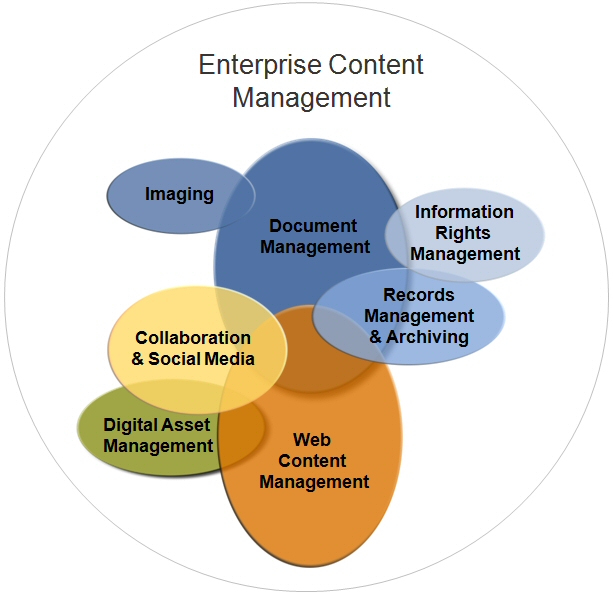Continuing the theme of the Future of ECM … trend #9 …
Dropping into the infrastructure layer
With the onset of a more service-oriented approach to content management, and with less differentiation between ECM vendors around core content functionality, we expect ECM platforms to drop into the infrastructure layer, becoming a core and essential part of every IT infrastructure. This is evident by the nature of recent acquisitions in the ECM marketplace (see my blog Market consolidation below) with infrastructure players making a much bigger move into the market. For example, HP acquiring Tower Software, IBM acquiring FileNet, Oracle acquiring Stellent, EMC acquiring Documentum, SAP partnering with Open Text, and Microsoft pushing relentlessly forward with SharePoint. This drive is forcing a greater commoditisation of ECM.
Switching from a technical to a business discipline
However, for ECM to truly become a commodity, it will need to be available on-demand and charged to organisations based on the functionality and services that they use. In this way, for the most part, organisations will only need to be concerned about the business implementation of ECM rather worrying about what features and functionality it provides or how it will be implemented behind the scenes. I believe that the knock-on ramifications of this last point will have a really important and positive impact on ECM going forwards, potentially doubling the success rate of ECM deployments.
Why? Because from the outset of an ECM programme it will enable organisations to focus on what they want to achieve in three-five years time, carefully defining the strategy that will be required to get them there, in addition to identifying the appropriate metrics that will define and measure success.
Many organisations spend a disproportionate amount of time on the short-term evaluation and selection of an ECM product versus the time spent planning and focusing on the details of the longer-term business problems that need to be solved. Interestingly, when it comes to Microsoft SharePoint, the converse is almost true, as organisations tend to spend very little time on the evaluation and selection process, but unfortunately also spend very little time on the business problems that need to be solved. Although Microsoft SharePoint is arguably a step towards “ECM for the masses”, it is also often mistakenly seen as a piece of technology to deploy and forget, rather than something that requires just as much planning and control as any other ECM product in order to be successful.
However, in general, as the core functionality of ECM becomes commoditised, it will enable ECM to effectively switch from a technical to a business discipline, giving organisations the freedom to really focus on:
- The needs of the business;
- The roles and responsibilities that will be required (many of which will be new to the organisation);
- Information Governance;
- Training and business change;
- The user experience.
These are all the kind of factors that will make the ECM deployment and roll-out a success. As the core functionality of ECM becomes a commodity, it will give organisations more time to take the “M” in ECM more seriously.
ECM reforms to something bigger
There are significant overlaps in terms of core functionality between the different disciplines of ECM, as illustrated in the diagram below (acknowledging that different people will have a different view on what disciplines actually make up ECM).
I believe that many of the distinctions between the different disciplines will become increasingly blurred, morphing into more of a collection of information management services, and over time, terms like “document management” and “web content management” as distinct disciplines will fade as relevant marketing terms. In fact, we also see the demise of “ECM” as an overall term, as it reforms into something much broader, progressively incorporating many of the technologies that sit adjacent to a typical ECM implementation.
I believe that over the next five years, ECM vendors are likely to start re-positioning themselves, aligning more to Information Management than specifically “ECM”.
